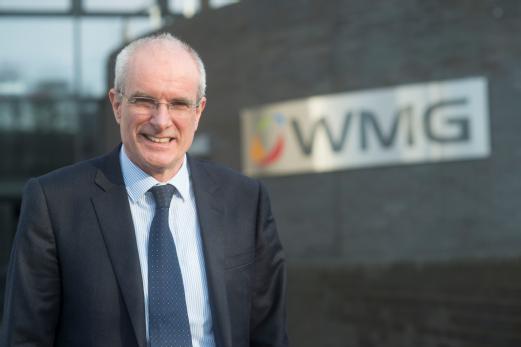WMG Insights
Supporting the Green Industrial Revolution by equipping organisations with automation systems expertise
Professor Robert Harrison, Head of Automation Systems Group at WMG and Rehan Khan, Automation Systems Group Teaching Fellow
Together with Automation Systems Group Teaching Fellow Rehan Khan, Head of Automation Systems Group at WMG, University of Warwick Professor Robert Harrison offers a thought-provoking insight into the imperative need for organisations to invest in workforce skills to support the Green Industrial Revolution.
Robert Harrison offers a thought-provoking insight into the imperative need for organisations to invest in workforce skills to support the Green Industrial Revolution.
Treading carefully to reduce carbon footprint
No matter the company, sustainability is a frequently emerging trend in strategies and business. Whether it’s saving energy, reducing waste or introducing sustainable materials – the minimisation of carbon footprint is becoming an increasingly prevalent priority for organisations as they endeavour to align with plans to meet the government’s Net Zero ambitions.
The Green Industrial Revolution is a pivotal point in time for sectors, industries and organisations of all scales and sizes. To thrive throughout this period of transition to a greener planet, businesses must acknowledge the importance of educating workforces to ensure that they are equipped with the required skills to deliver the needs of industry whilst support a more environmentally friendly world.
The importance of developing the right education offer
Devising training courses in isolation in a ‘one-size-fits-all’ model will have limited impact. Instead, change will continue to be driven as a result of strong individual relationships built between academia and industry, which is the only way to fully understand a business’ challenges, and even foresee and suggest necessary changes for them. At WMG, University of Warwick, we seek to deliver research-informed teaching that responds to the needs of current and future industrial needs.
WMG’s Automaton Systems Group (ASG)is dedicated to evolving tools, technologies and strategies to mould and shape the future of multiple sectors, from transport to manufacturing. From our core presence in the automotive sector we can see an emerging focus on the lifecycle of automation in manufacturing, process control and embedded systems. However, the need for skills across these areas is sector agonistic, not just limited to automotive applications. On that basis, AGS collaborates with industry partners to establish core expertise in reconfigurable automation systems, and related engineering tools and methods – from shop floor to top floor.
Reducing volumes of waste and scrap to landfill
Our data collection, analysis and communications with industry suggest that waste reduction is a key area of focus for organisations where new skills are required to improve processes around not only traditional waste reduction methods, but also eliminating over, or incorrect production through the use of smarter systems.
This extends to products that are created and have served their initial purpose – what happens to them once the user is finished with them? Such products should be given a ‘second life’ where possible. Repurposing materials and products is integral to a sustainability-focused model, . Another key avenue in which to reduce waste is to optimise supply chains, namely by cutting out excess shipping.
Industry’s engagement with research and development is essential if businesses are to identify where process improvements can be implemented to minimise waste. However, in order to successfully implement sustainable process changes, investment in education is required to equip workforces with the skills needed to deliver and maintain these process step changes.
Through expertise in Augmented Reality and tool-tracking, automated logistics and autonomous mobile robots, systems integration, data analysis, Artificial Intelligence, simulation, scale-up and skills training, we acknowledge the importance of informing decision makers in organisations but also reskilling, upskilling and new-skilling the workforces across key disciplines to help implement these changes. The technologies are of little use without the necessary skills to support them.
Reskilling is training people to do a different job, providing them with new skills to adhere to a new system. Upskilling entails building upon existing skills, contributing to the original skillset to become competent within the new system. New-skilling revolves around information sharing and training that is not based on any prior experience or knowledge in the area.
The WMG Skills Centre
It is these three avenues of education that are most pivotal in the strategy of WMG’s Skills Centre. The Centre was launched in January 2022 as a provision for organisations to develop their workforce through short, innovative courses designed to introduce and evolve technical skills.
UK businesses have endured unprecedented hardships and challenges in recent years with issues such as Brexit and COVID-19, and the need to achieve Net Zero poses the next key milestone. Our course content and research has been specifically designed to incorporate this, with the view to enable these organisations to understand and innovate their models to align to this need.
To combat current, upcoming and potential future societal and global challenges, the WMG Skills Centre offers an opportunity for companies to learn and evolve. To support the Green Industrial Revolution, this will be primarily achieved by reducing waste to landfill, minimalising carbon footprint, and educating the workforce.
For more information about the WMG Skills centre visit: https://warwick.ac.uk/fac/sci/wmg/skillscentre/
Article originally featured in The Manufacturer here: https://www.themanufacturer.com/articles/supporting-the-green-industrial-revolution/
more information.
